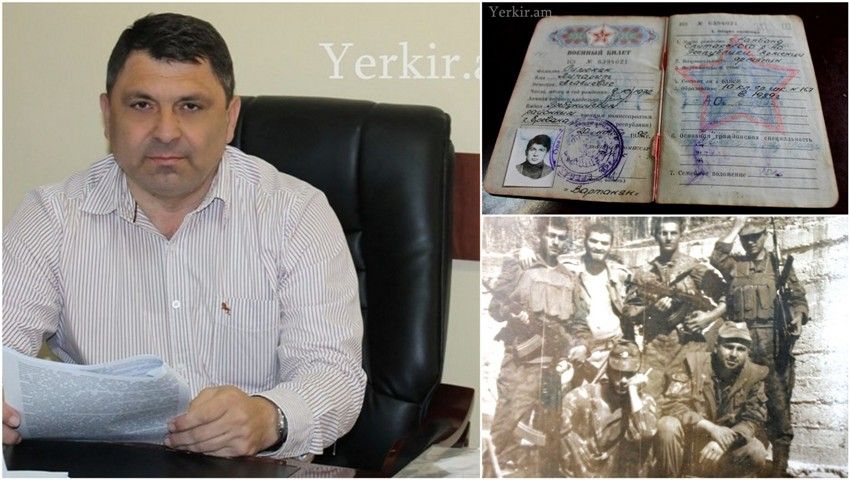THE LAWS OF WAR ARE CLOSER TO MORALITY. AN INTERVIEW WITH LIPARIT SIMONYAN
24.10.2016 10:38
The war has its laws: on the field of the battle, as also before the laws all are equal, regardless the profession, the path strewn… Yerkir.am starts its series of interviews that is called “The war and the defenders of the law”, dedicated to the Armenian independence and the 25-th anniversary of the Armenian army. Our interlocutors are defenders of the law: lawyers, who have their own contribution in Artsakh battle.
Our first interlocutor is an advocate, the participant of Artsakh battle Liparit Simonyan.
Liparit Simonyan was born in 1972 in Nalband village of Spitak region. In 1992 served in the special purpose regiment in Stepanavan, took part in the liberation of Kharvachar, Zangelan, Horadiz, Fizuli. Is the member of the Chamber of Advocates of RA.
-Were you a lawyer, when the war broke out?
- In December 1992 I performed military service in the special purpose regiment in Stepanavan. At that time I was 20 years old, studying my second year at the law faculty of the open university of Armenia. I was a student when I set off to the front. On returning from Artsakh, I continued my education, afterwards for some time got involved into diplomacy, and then – advocacy.
-When have you felt the breath of war for the first time?
–In the March of 1993 we got our first military task and set off to Kharvachar. There I saw what is called war for the first time. At that time Kharvachar was almost empty, only fedayis were there, but that was just the beginning of all those things that were waiting for us. After that we moved to South, participated in the liberation of Zangelan, and then Horadiz, Fizuli… On the 4-th of March 1994 during the battles in Fizuli I was wounded in both arms.
- The laws of war are different, which one is of the utmost importance that is to be followed by the soldier in the battlefield?
-To my mind, the laws of war are closer to morality; anyhow, they are more precise and definite. In the trench, no matter officer or an ordinary soldier both are equal people. From our people no one would injure the wounded enemy, that is a fact, there were many cases, when even we displayed medical help to wounded enemies. Beating the captive wasn’t accepted. But these laws weren’t acceptable for the enemy, and that was proved by history, that they constantly turned to meanness. The tortures of the April war are a clear proof of that fact.
- Is there a war episode that “chases” you till now?
-The death of my battle friend Arshak… During the night of Zangelan’s liberation, when we were waiting for a counterattack the enemy started to pellet. Arshak went to his trench and in the morning we found him dead.
- During the war years did you have to defend someone else or yourself by the help of the law?
-Those were the war years, once we came from Meghri to Yerevan to escort the ministry of defense car that was delivering weapon to Karabakh. During those years it was something common to move round Meghri, Kapan, Artsakh and other regions with weapon. And I used to think that it was common for Yerevan also. I used to live in Sari takh (mountain district), and went home with weapon, then, carrying the same weapon, took a bus and went to “Rossia” fair. Here the military police came to deliver me to the police office. And I started to explain my rights, tried to substantiate why I had weapon and where I was leading my way. This was the first time I had defended my rights, though I had no right to move round Yerevan with weapon.
- Was there any principle or a law that you had defined for yourself and that you were led by during those years?
-During the war I kept on thinking of returning with the same stuff of fellows that we had set off to the war with. Of course, we all acknowledged that it was impossible but that was how we disposed ourselves.
-What is the price for peace for you?
-Today we can say for sure that the boys who died for piece had to live in a decent country. This did also display the April war, that our boys of 18 years old or elder are always ready to defend their country, just the government mustn’t forget those boys, we have to appreciate them deservedly.
- During your advocacy activity did you often present the interests of servicemen?
-Yes, there were many cases. On defending the rights of soldiers my inspiration is augmented, let us say, and has a sort of nostalgia (smiles), with them I return for a moment to my past. But, to be honest, our laws on the matters of crimes committed by soldiers are stricter than the ones towards ordinary citizens.
-So, is the strictness of the punishment prescribed for soldiers’ crimes not justified?
-To my mind, for “light” crimes during the military service the soldier mustn’t be strictly punished, but not be left idle. The soldiers, especially of the same age are of different personalities and they stay idle, their interpersonal relationships can deteriorate, can become strained, that’s why punishing them strictly isn’t the best measure.
-They say army is one of the main schools of manhood, do you agree with that?
-Of course, when my son grows up he will surely serve, because the army is the place where the soldier attains a personality, there is no mother or father, and moreover, the boy from the neighborhood, the soldier can take there his own personal decisions, learn to orient himself in the right direction in different life circumstances.
Interview by Taguhi Melkonyan
DOWNLOAD
BACK






















